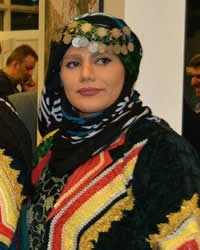Luri, Feyli in Iran

Photo Source:
Shadegan - Wikimedia
Creative Commons
|
Send Joshua Project a map of this people group.
|
| People Name: | Luri, Feyli |
| Country: | Iran |
| 10/40 Window: | Yes |
| Population: | 2,588,000 |
| World Population: | 3,088,000 |
| Primary Language: | Luri, Northern |
| Primary Religion: | Islam |
| Christian Adherents: | 0.00 % |
| Evangelicals: | 0.00 % |
| Scripture: | New Testament |
| Ministry Resources: | Yes |
| Jesus Film: | Yes |
| Audio Recordings: | Yes |
| People Cluster: | Luri-Bakhtiari |
| Affinity Bloc: | Persian-Median |
| Progress Level: |
|
Introduction / History
Luri is the name of a nomadic tribe of shepherds who live in the Zagros Mountains of southwestern Iran.
What Are Their Lives Like?
They live as nomads, traveling six to eight months out of the year and living in black goat-hair tents. Luri society is dominated by those possessing the largest herds and the most money. Those from the upper class hire members of the lower class to tend their flocks.
What Are Their Beliefs?
The Luri are practicing Shia Muslims. However, unlike many of the Shia who tend to be entirely dogmatic in their beliefs, the Luri have adopted a very practical belief system with simple religious practices. Shrines dedicated to holy men (founders of various Islamic groups) are scattered throughout their region. The Luri believe these shrines possess healing powers. People with physical and psychological ailments visit shrines each year in hopes of being cured.
What Are Their Needs?
Luris need the spiritual hunger it will take to find Christ no matter what the cost.
Prayer Points
Pray that God would send messengers who will recognize and engage with persons of peace among the Northern Luri in Iran.
Pray that church planting movements would begin among these nomadic people, spreading to other nomadic groups.
Ask Almighty God to cause his abundant life and love through Jesus to be widely embraced by these nomadic families.
Pray that they would accept followers of Christ to live and work among them.
Pray for God to demonstrate his blessing, strengthening and healing families and communities.